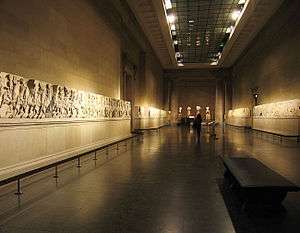Latest News for: parthenon marbles
Edit
Stephen Fry assured the return of Parthenon Marbles will happen: Ouzo Talk Podcast 2024
Greek City Times 15 Nov 2024
Stephen Fry confidently predicts the imminent return of the Parthenon Marbles in a recent interview on the ...
Edit
British Museum chief Nicholas Cullinan: ‘I start with the idea that everything is possible’
Financial Times 15 Nov 2024
Edit
The Case Against Returning the Elgin Marbles
The Daily Sceptic 14 Nov 2024
The vast majority of Greek people want the Parthenon Marbles to be returned ... The Parthenon marbles are kept there as exemplars of the highest achievements of human civilisation, for which the British Museum serves as steward and trustee.
Edit
The Spoils director says film forces art world to confront ‘loaded issue’ of restitution
The Guardian 10 Nov 2024
Documentary shows the fight to recover paintings that Jewish art dealer was forced to sell by ...
Edit
Will Labour return the Elgin Marbles?
The Spectator 28 Oct 2024
‘UK Culture Secretary “Keen to Talk” with Greece to Resolve Parthenon Marbles Dispute’, screamed the headline ... the Parthenon Marbles issue differently from the previous Conservative government.
Edit
‘It’s quite a thing to do a show here and openly use the word looting’: artist Hew Locke on decolonising the British Museum
The Observer 13 Oct 2024
Edit
British Former Lawmaker Says Parthenon Marbles Stolen, Wants Return
The National Herald 01 Oct 2024
Edit
A Win-Win Path for the Parthenon Sculptures: Athens Event Champions the Return of the Marbles ...
Greek City Times 01 Oct 2024
Edit
Sir Keir Starmer ‘wants a solution’ on Elgin Marbles
AOL 28 Sep 2024
Sir Keir Starmer “wants a solution” to the long-standing row over the Elgin Marbles, a former member of his shadow cabinet has claimed.
- 1
- 2
- Next page »




